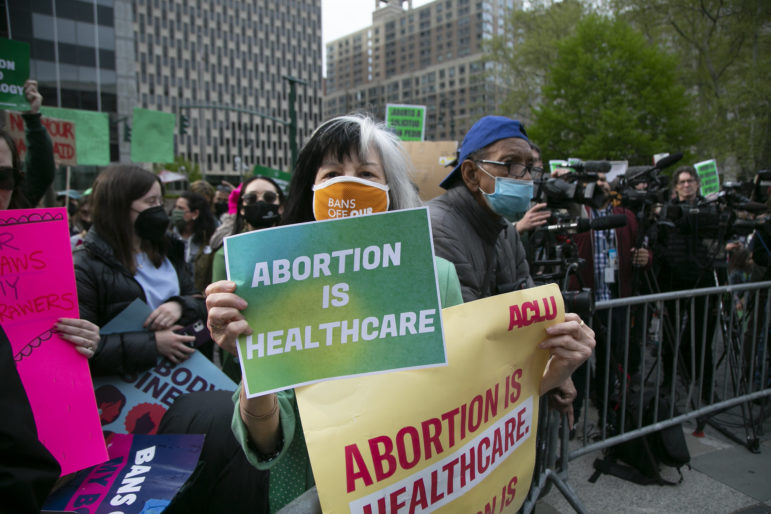“New York has been a longtime safe haven for abortions, with 10 percent of abortions performed in the state in 2019 being out-of-state residents, and is gearing up for a surge of patients traveling in from other states. But we cannot settle into a false sense of safety, since on a national level, civil liberties and basic freedoms are under attack.”

William Alatriste/NYC Council Media Unit
A rally for reproductive rights in Lower Manhattan in May.Over the past weeks, I have watched as folks engaged in thought-provoking dialogue about abortion, the right to bodily autonomy and the fight ahead to address what is now the law of the land after SCOTUS’ decision to overturn Roe v. Wade. Among all of the coverage, there has been a noticeable lack of discussion around inclusion for all bodies, regardless of gender identity and of willingness to include trans masculine (more commonly referred to as transgender men) and assigned female at birth (AFAB) folks who will also need protection and support.
AFAB folks who may not identify as female now are still capable of procreation and are just as heavily, if not more heavily, impacted by the overturning of Roe v. Wade. As transgender individuals are more likely to live in poverty and be unemployed or underemployed, they are also disproportionately impacted by policies regarding healthcare.
Women who are enraged at the thought that someone else could determine what healthcare looks like for them have to be willing to include the needs of the trans/AFAB community. A lack of inclusion implies that these folks do not have the same right to self-determination over their bodies and when/if they decide to start families.
As New Yorkers, we live in a state that protects abortion rights, with legislators moving to enshrine abortion in the state constitution in an attempt to safeguard against potential future federal threats. New York has been a longtime safe haven for abortions, with 10 percent of abortions performed in the state in 2019 being out-of-state residents, and is gearing up for a surge of patients traveling in from other states. But we cannot settle into a false sense of safety, since on a national level, civil liberties and basic freedoms are under attack. Until we stop this othering, we’ll lose this fight and every other fight coming our way. We are in the fight for our lives.
In this moment it is imperative to embrace all those who have been othered, ignored and left behind. We have to see this fight for what it is: a fight against all of us. We cannot plan a course forward without including all voices in our strategic planning. Solutions that are rooted in the same type of authoritarian behavior as SCOTUS’ ruling has demonstrated will weaken the cause of our fight. History has revealed that the fight for women’s rights has not been inclusive to all those affected. The women’s rights movement ignored Black women for years, only begrudgingly bringing them along. The gay rights movement ignored the transgender community, despite the fact that the Stonewall riot was started by trans women of color. While both these movements have become more inclusive over time, this progress took decades. We do not have that time.
In congruence with the overturning of Roe v. Wade, it is important to recognize the existence of a larger coordinated attack to strip away people’s rights. Anti-trans and anti-LGBTQ+ legislation have consistently been presented and even passed in our government in recent years on the state level. Anti-Black racism has run rampant in our country as government officials continue to turn a blind eye and refuse to enforce change. Anti-choice individuals have spent the past few weeks celebrating the ban on abortions while others are left to consider which of their rights will be stripped away next. Understanding how these attacks are all dependent on one another to uphold standards of patriarchy and white supremacy in our nation is vital.
Our goal and mission is to bring the voices of all affected groups to the table. We need to listen and respond to those who are directly impacted, but who have been historically silenced. Their voices are needed as we develop a plan for those in states where abortions are now illegal. It is critical to our mission that this plan be designed with the correct messaging to reach and include trans masculine and AFAB voices. It is the only way forward for not only the fight for abortion rights, but all the other inevitable fights to come.
Divisive behavior can no longer exist in the face of this new America. The things that divide us in no way compare to those things that bring us together. We all want the right to vote, to care for our bodies, to be heard. We must unite, and unite quickly.
Sean Ebony Coleman is the founder and executive director of LGBTQ+ organization Destination Tomorrow and a longtime activist for Transgender/Gender-nonconforming rights.









3 thoughts on “Opinion: The Fight for Reproductive Rights Must Be An Inclusive One”
I appreciate you taking the time to write this post, which is really helpful and engaging because of the content. truly grateful for.
I appreciate you taking the time to write this post, which is really helpful and engaging because of the content.
nice post